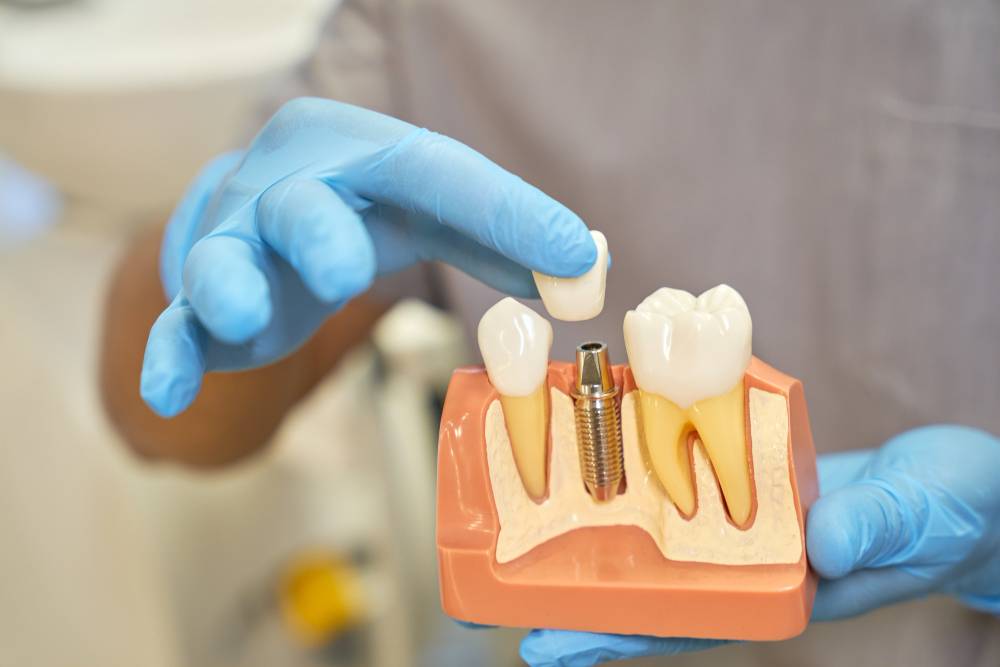People who are missing one or more teeth are increasingly turning to dental implants for tooth replacement. Though they can be expensive, many people feel the benefits are worth the cost.
But is dental implant surgery worth the investment? Here are the pros and cons to help you make an informed decision.
What Are Dental Implants?

Dental implants are artificial dental fixtures used to replace one or more missing teeth. The metal post is made from titanium. It is a material compatible with human bone.
Dental implants come in three forms: endosteal, zygomatic, and subperiosteal.
- Endosteal implants are embedded directly in the jaw bone. These are the most common type of dental implants used.
- Zygomatic implants are embedded in the cheekbone and used for patients with insufficient jaw bone density for endosteal implants.
- Subperiosteal implants are placed above the jaw bone and are used for patients who cannot have dental surgery.
Once the dental implant is in place, it is allowed to fuse with the bone over time. This is a process called osseointegration. Once osseointegration is complete, a dental prosthetic (a false tooth) can be attached to the implant.
Dental implants are in-demand because they look and feel like natural teeth. These artificial teeth also don’t require special care; you can brush and floss them just like your natural ones.
Before committing to dental implant surgery, talk to your dentist about your expectations.
What Should I Expect When Getting Dental Implants?
If you’re considering dental implants, you may wonder what to expect. The good news is that the procedure is typically quick and relatively painless. Most people report feeling little to no discomfort during the procedure itself. However, you may experience some pain, soreness, and swelling afterwards, which can be easily managed with over-the-counter pain medication.
Getting dental implants is a multi-step process. Here’s what to expect before, during, and after the procedure:
- The first step in the dental implant procedure is to consult with a dentist experienced in dental implant placement. They will evaluate your teeth, jaw bone, gums as well as your overall health to determine whether you are a good candidate for dental implants.
- If you are found to be a good candidate, they will develop an implant treatment plan customised for you.
- The next step is to have surgery to place the dental implants. This usually takes place in two stages. In the first stage, a metal screw is placed in the jaw bone. This screw will serve as the new tooth root. In the second stage, a connector will be placed on top of the screw to serve as an attachment for a dental crown. The dental crown looks and functions like a natural tooth. The dentist will place the connector and the dental crown after the implants have healed and fused with the jaw bone, which usually takes at least three months.
As far as cost goes, dental implants are typically more expensive than other dental procedures such as bridges or dentures. However, they are also more durable and long-lasting, so many people feel they are worth the investment.
If you have dental insurance, your policy may cover at least a portion of the cost of your implants. In any case, your dentist should be able to give you a reasonable estimate of what your out-of-pocket costs will be before you proceed with the procedure.
But like most people, you’re probably wondering if dental implants are worth it. And because they don’t necessarily come cheap, it’s easy to understand why.
Is It Worth It to Get Dental Implants?
Dental implants are one of the most common dental procedures available today. Aside from replacing missing teeth, they provide several benefits, including improved oral health, increased chewing efficiency, and enhanced aesthetics. Dental implants can also help preserve healthy bone tissue and prevent further tooth loss.
In general, dental implants are considered to be a long-term investment, and they typically last for many years with proper care. However, dental implants can also be quite costly, so it’s important to weigh the pros and cons before making a decision.
What Are the Pros of Dental Implants?

Dental implants are quickly becoming the gold standard in the field of tooth replacement. Unlike dental bridges or conventional dentures, which rest on the surface of the gums, dental implants are surgically anchored in the jawbone. As a result, the fit is more secure, and it is less likely to slip or come loose.
Additionally, dental implants offer many other benefits, such as:
- They look and feel very natural.
- They help preserve natural facial structure, preventing your face from appearing sunken or wrinkled and giving you a beautiful smile.
- They stimulate the jawbone, preventing the bone loss that often occurs after tooth loss.
- They can be used to support dental bridges and dentures, making them a versatile option for patients with different needs.
- They are easy to care for – brush and floss them like your natural teeth.
- They can last for many years, or even a lifetime, with proper care. Other options, like removable dentures, may need to be replaced every few years.
Despite the drawbacks, dental implants can provide a safe and effective option for people looking for a single replacement tooth or complete dentures.
What Are the Cons of Dental Implants?
A few cons to dental implants are worth considering before you decide to get them.
- They can be quite expensive. The surgery itself is not cheap, and the implants themselves are costly.
- There is a risk of infection associated with any surgery, and dental implant surgery is no exception.
- The implant could be rejected by your body, resulting in implant failure.
- It can take several months for the dental crown to be placed. You will likely have to wear a removable dental appliance during the healing period.
- Some people may have difficulty tolerating the implant materials.
- People with active gum disease or periodontal disease cannot get dental implants.
These cons should be weighed against the many pros of dental implants, which include improved oral and dental health, a more natural look and feel, and increased durability. Ultimately, the decision of whether or not to get dental implants is a personal one that should be made after careful consideration.
Do Dental Implants Get Cavities?
Dental implants are strong and look just like natural teeth, prompting people to wonder if they get cavities. The short answer is no; dental implants cannot get cavities. Cavities are caused by bacteria that attack the tooth enamel, and dental implants do not have any tooth enamel.
Dental implants are made of titanium, a material resistant to corrosion and wear. That means you don’t have to worry about developing cavities in your dental implants. However, it’s still important to practice good dental habits. Take good care of your dental implants by brushing and flossing them daily. Maintain a dental care schedule by visiting your dentist regularly. While your dental implant will never develop a cavity, plaque accumulation between it and the permanent adjacent teeth can lead to tooth decay and cavities in your permanent teeth.
With proper care, your dental implants can last a lifetime. This will give you a return on your investment because dental implants do not come cheap!
How Much Does a Dental Implant Cost in Australia?
When it comes to dental implants, there is no one-size-fits-all answer to the question of cost. The price of dental implants will vary depending on several factors, including:
- the type of implant
- the number of implants required
- the complexity of the dental implant procedure
- the need for other dental procedures such as tooth extractions, sinus lifts, and bone grafting
Dental implants are generally more expensive than other tooth replacement options such as bridges or dentures. In Australia, dental implants typically cost between $4,000 and $6,000 per implant. This includes the cost of the implant itself, as well as the surgery to place it. The costs for additional procedures are not yet included in this cost estimate. The final cost will depend on your case. Your dentist will be able to give you a more accurate quotation during a consultation.
In some cases, some patients may be eligible for rebates from their health insurance provider, which can reduce out-of-pocket cost. It is important to check with your insurer beforehand. For patients who are unable to afford dental implants, there are several financing options available.
Final Thoughts
So, are dental implants a wise investment? The answer to this question is, unfortunately, not black and white. It depends on each individual’s unique situation and budget.
However, dental implants can be a wise investment for many reasons. They last longer than other dental treatments, they look and feel more natural, and they can improve your oral health in the long run by preventing bone loss and gum recession.
Additionally, they provide long-lasting results and are more cost-effective than other treatments, such as bridges or dentures. For these reasons, many people feel that dental implants are well worth the initial investment.
If you are considering getting dental implants and want more information, please visit our website or call Comfort Care Dental at (08) 9516-2890 to book an appointment. We would be happy to help you make the best decision for your oral health!
